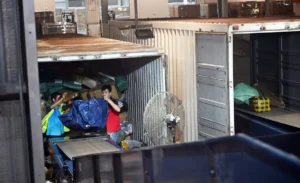The rapid development of cross-border e-commerce platforms has increased commercial fraud, smuggling and illegal transportation of goods.
This poses a major challenge, forcing even the world’s leading economic countries to tighten management of these e-commerce platforms.
US restricts cheap Chinese goods from entering
Cross-border e-commerce is becoming an inevitable development trend in the global economy, bringing many great benefits to businesses. Trading through international e-commerce platforms helps businesses expand their markets, save costs and time compared to traditional trading methods. However, the “overheated” development of these e-commerce platforms is posing many challenges and risks that significantly affect many businesses in the US.
The Biden administration has been taking steps to curb the influx of cheap Chinese goods. The US government said it would try to curb the “overuse and abuse” of a mechanism that allows low-value imports to enter the country duty-free, as concerns about shipments from China grow.
Specifically, in a recent adjustment effort, US officials will seek to remove some products from tariff exemptions, a move that could affect a large portion of textile and apparel imports from China.
According to statistics, while about 140 million shipments were imported into the United States duty-free under Section 321 of the US Customs Code, also known as the de minimis rule, a decade ago, that number skyrocketed to more than a billion shipments last year.
The provision allows Chinese e-commerce companies to avoid paying taxes or fees on shipments shipped directly to consumers if they are valued at less than $800.
“Foreign companies, mainly Chinese-founded e-commerce platforms, are helping to flood the US market with cheap Chinese goods,” said Navtej Dhillon, deputy director of the National Economic Council, noting that this exponential increase in de minimis duty-free shipments makes it harder for US law enforcement to enforce them.
In addition, under the exemption, cheap imported goods will enter the United States more easily, potentially allowing unsafe products and illegal substances to avoid inspection when they enter the United States, putting consumers at great risk of using poor quality counterfeit goods that affect their health.
Cheap “de minimis” imports also muddy the figures. According to US Customs data, at least $37 billion of the gap is in packages worth less than $800. The Economist calculates that the US trade deficit with China is 13% higher than official figures, with the rest of the world also 5% higher.
To prevent this, the US government will seek to exclude some products from the exemption list, which is expected to include items subject to tariffs under Section 301, the main tool the US uses to impose tariffs on Chinese goods.
But US officials also added that the stricter rules would not apply to imports from just one country.
US officials will also seek to impose stricter rules on parties that want to continue using de minimis provisions, such as disclosure requirements. “The administration is calling on the US Congress to pass legislation this year to comprehensively reform the de minimis provision,” Singh said.
European Union (EU) opens investigation into Temu
The EU’s move against PDD Holdings’ (China) e-commerce platform Temu comes from the reason of failing to prevent the sale of illegal goods.
According to the European Competition Commissioner, the EU wants to ensure that Temu complies with the Digital Services Act (DSA). In particular, it wants to ensure that products sold on the platform meet EU standards and do not harm consumers.
Under the EU Digital Services Act, internet platforms with more than 45 million users in the region must take measures to prevent the spread of false information and illegal content, or face fines of up to 6% of their global turnover.
A Temu spokesperson said the company will work closely with regulators and is committed to taking its obligations under the DSA seriously, while continuously investing to improve its compliance and consumer protection systems. Temu is also in discussions to join a voluntary agreement organised by the EC to combat the sale of counterfeit products online.
Temu is the latest major tech company to be targeted by the EU under the DSA as the bloc works to become the global standard for tech regulation. Other companies facing DSA action include Meta, AliExpress, TikTok and X.
During the investigation, the e-commerce platform owned by China’s PDD Holdings could make commitments to address the EC’s concerns, potentially avoiding penalties.
The investigation comes after Temu was asked by the EU on October 11 to share data on how it tackles counterfeit or unsafe products on its market. At the time, the EC asked for “detailed information and internal documentation on the mitigation measures taken to address the presence of traders selling illegal products” on Temu.
Since PDD expanded Temu globally, the platform has grown exponentially, quickly becoming one of the most downloaded apps in the United States. Flash sales, game-like features, and attractive prices have attracted consumers in dozens of countries around the world.
Southeast Asia struggles to stop cheap imports
Bandung, in Indonesia’s West Java province, is a region known for its textiles such as batik, hand-woven fabrics and silk. However, according to Neng Wati, manager of the Asnur Konveksi textile factory, thousands of local workers have recently been left without jobs and stable income.
Such cases are not uncommon in Indonesia, and they are becoming more serious, dealing a heavy blow to the textile industry. According to the Nusantara Confederation of Trade Unions, at least 12 textile factories in the country have ceased operations in the first seven months of 2024, leaving more than 12,000 workers unemployed. The biggest challenge is cheap imports from China.
Not only Indonesia, industry groups in other Southeast Asian countries such as Thailand and Malaysia have also expressed growing concerns about the influx of cheap imports from China. Domestic manufacturers have been unable to compete with this influx and have suffered huge losses in sales.
“The influx of Chinese goods has affected Thailand’s manufacturing sector to varying degrees, depending on the industry, especially electrical appliances, textiles and furniture,” Piti Disyatat, secretary of the Monetary Policy Committee (MPC) of the Bank of Thailand, told the Bangkok Post.
This situation has forced the governments of many Southeast Asian countries to step up support for domestic manufacturing.
In Indonesia, a worker protest in Jakarta prompted Trade Minister Zulkifli Hasan to announce that the government would impose import tariffs of up to 200% on some products from China, notably textiles, clothing, footwear, electronics, ceramics and cosmetics, to try to protect domestic businesses and prevent layoffs.
“The US can impose 200% tariffs on imported ceramics or clothing, so we can do the same,” to ensure industries and micro, small and medium-sized enterprises can “survive and thrive,” said Minister Zulkifli.
Meanwhile, in Thailand, the government has also implemented an emergency measure by applying a 7% value-added tax on all imported products, a significant change from the previous regulation when the tax was only collected on imported products priced above 1,500 baht ($44). This policy will only be effective from July to December this year to give the government time to study the issue before applying longer-term solutions.
The Thai government will set up a new committee to deal with the influx of cheap Chinese goods into online and offline markets, as they are causing serious damage to local businesses.
In Malaysia, the country’s Ministry of Trade is also reviewing its anti-dumping law and plans to submit it to parliament next year.
However, at the same time, Southeast Asian governments also face another problem. They need to ensure that measures to support domestic manufacturing will not negatively impact trade relations with China or other economic sectors. The issue of balancing trade relations with China – will also be considered by Southeast Asian countries when issuing policies to tighten cheap goods on e-commerce platforms.
















